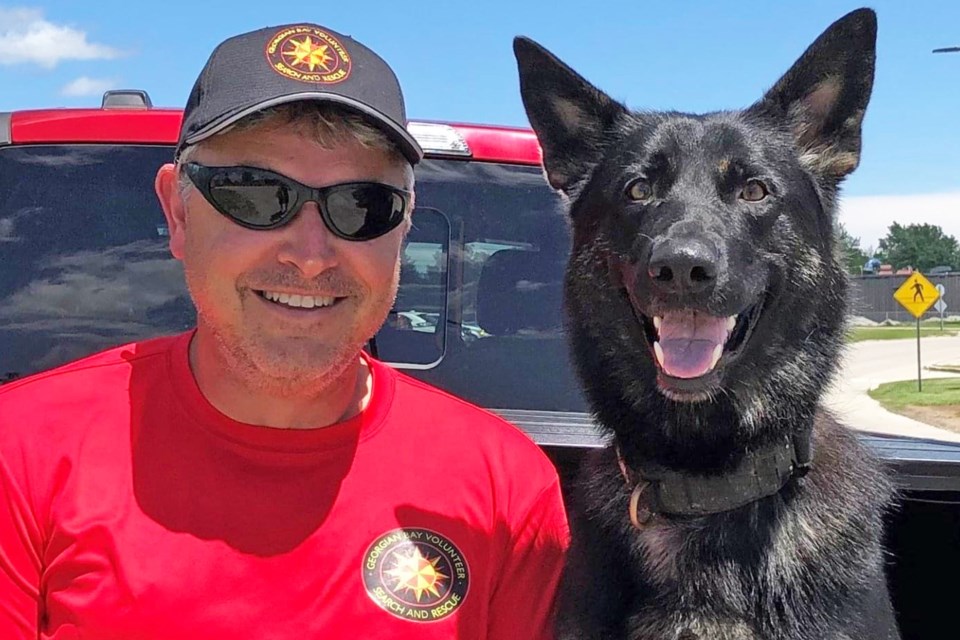As a dog handler with the Barrie-based Georgian Bay Volunteer Search and Rescue (GBVSAR) organization, Bruno Baker is part of a team that has a canine unit with two certified dogs and three more in training.
Their role is to locate people or the clues they may have left behind.
Baker explained the three main tracking disciplines that are involved.
“(There's) tracking a path, where a dog is asked to follow the footsteps of a person where they have walked before. They will put their nose to the ground and will lead the us along the exact path that the person has walked,” he tells BarrieToday.
“They can ask the dog to find a person in a forest, and now the dog has its nose up in the air and is trying to smell the faint odour of a person rather than where they have walked," Baker adds.
Baker also explained that the dogs can be tasked with finding “something” that doesn’t belong in the environment, where the dog’s nose goes back down to the ground and it just smells things around in the environment and looks for something that does not belong there. That could be a pack of cigarettes or gum they may have dropped, a toque, a glove, anything at all.
Ontario Provincial Police have their own search and rescue dogs, “but sometimes they don’t have enough, they are not available and then they rely on volunteers, and that’s where we come in,” Baker says.
The amount of training time depends on how experienced the handler is.
“My dog is one that is looking to get certification in July, and we’ve been training for about 20 months. So, for a new person, it’s about two years,” he says.
“It is intense training. My partner and I, we train three days a week, full days, and all over southern Ontario, plus what we do on our own, as well, because the dog may need to have obedience. Then they need to be agility-trained. It’s a lifetime (effort)," Baker notes.
The dogs begin their training young, at six months old, “which is the best time to start them,” he says.
“You don’t want to wait much longer than that because it’s a hard life and not every dog is necessarily good in that role," Baker adds. "Typically, the hunting and herding breeds are better, because that is what they were bred for. By the time they are three, they need to start working and have a productive working life of four or five years.”
Baker’s dog, Mikaw, is a two-year-old German shepherd. Her name is an Ojibwe word meaning “to find."
The handlers try to expose the dogs to as many different situations as possible, because the animals must be confident wherever they take them.
Canadian Wings and Rescue, a volunteer charity organization that works with Canadian animal rescue groups, shelters and wildlife rehabilitation with transportation needs, has offered the handlers three of their airplanes and their pilots on May 16, so that they can put the dogs on the airplane, as they could be called upon to search an area that could only be accessible by plane.
“We need to know that the dog isn’t going to freak out in the air, or be sick. We will be getting the dogs used to the noises, take-off and landing, and loading of the airplane. We have to manhandle them a bit and they have to accept that,” Baker says.
Baker says these dogs have an extraordinary drive to play. They will work hours at a time, because they know that at the end, the prize is a little bit of playtime.
“When we find a person, Mikaw will run back to me and literally jump on me, which is the only time she is allowed to jump, and tells me 'I’ve found someone and you’d better follow me!'
“She’ll run back and forth between the lost person and me until I get there. And once we get there, it’s play time. A ball comes out and that’s their paycheque."
It's well known that dogs can get depressed when not finding people alive during a disaster, such as an earthquake or a flood, but with these dogs, it’s handled differently.
“No, we always win. We always give them a situation where they always win in the end and get rewarded,” Baker says.
“Our dogs are trained to find live people. Finding deceased people is another discipline altogether that we are not training in," he adds. "Urban search and rescue is another discipline that we do not do. We specialize in wilderness search and rescue.”
At the end of the day, what does Baker enjoy the most as a volunteer working with his dog?
“The most rewarding part of this for me is the hope to be in a position where I can help someone that is having a really bad day. That is the goal and the reason that we do this,” he says.
“It’s also the partnership I have with the dog. You end up with a relationship with the dog that is unlike anything else in the world. My dog is my partner and is always right next to me. She loves it.”
For more information on Georgian Bay Volunteer Search and Rescue, click here.



